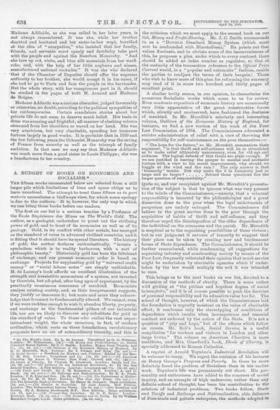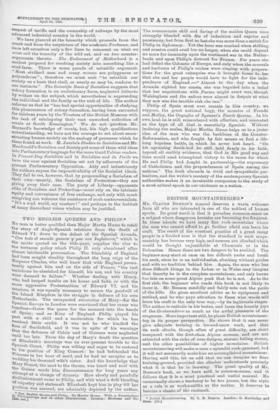A BUDGET OF BOOKS ON ECONOMICS AND SOCIALISM.*
THE fifteen works enumerated below are selected from a still larger pile which limitations of time and space oblige us to leave unnoticed. The attempt to treat these fifteen as in pani materia necessitates a bird's-eye view, for which some apology is due to the authors. It is, however, the only way in which we can bring these books before our readers.
The first on our list is a serious treatise by a Professor of the .Ecole Superieure des Mines on The World's Odd. The author, as a geologist, undertakes to point out the civilising power of gold, and to treat of its economics as well as of its geology. Gold, in its conflict with other metals, has emerged as the standard of value in advanced civilised countries, and it is fitting that it should have its special literature. The history of gold, the author declares enthusiastically, "invests a symbolism which is in reality barbarous, with a sort of philosophic beauty." Historically gold has been the lubricant of exchange, and our present economic order is based on exchange. Projects for supplanting gold by "universal credit money" or "social labour notes" are simply unthinkable. M. de Launay's book affords an excellent illustration of the strength and irresistible momentum of a system, not invented by theorists, but adopted, after long ages of experiment, by the practically unanimous consensus of mankind. Economists analyse existing society, and, as their temperament suggests, they justify or denounce it; but more and more they acknow- ledge that it cannot be fundamentally altered. We cannot, even if we were reckless enough to wish it, abandon liberty, property, and exchange as the fundamental pillars of our industrial life, nor are we likely to discover any substitute for gold as the standard cg value. To those who realise the vast super- incumbent weight, the whole structure, in fact, of modern civilisation, which rests on these foundations, revolutionary proposals have an air of extraordinary temerity, and this is
(1) The World's Cold. By L. de Launay. Translated by G. C. Williams. London: W. ]teinemann. 64:]--(2) Money and Profit-Sharing ; or, Double Standard Money System,. By J. C. Smith. London Kean Paul, Trench, and Co. [7s. 6d. net.]—(3) Outlines of the Economic litstory of England. By 11. 0. Meredith, M.A. London Sir I. Pitman and Sons. [6s. net.]— (4) Social Service a Handbook for Workers and Visitors. Edited, by the -Rev. G. M. Bell, London Long:nano and Co. [Is. 6d. not. J —(5) American Charities. By Amos G. Warner. Now York: Crowoll and Co. [$2.]- (6) Ideals of Charily. By Virginia M. Crawford. London ; Sands and Co. rt.. 6d. net.]—(7) Lectures on the Industrial Rerolultion„ do. By the late Arnold Toyuboo. A. New Edition. London: Longtnans and Co. [2s. Od. net.] —(8) Trade and Tariffs. By J. M. Robertson, M.P. London : A. and C. Black. [3s. 6d. not.]—(9) Railways and Nationalisation. By B. A. Pratt. London : P. S. King and Son. [2s. 60. net.]—(10) The Endowm4nt of Mother- hood. By Dr. M. D. Edon London: The New Ago Press. [le. not]— (Ii) The Scientific Basis of Socialism. By Henry M. Bernard. Same publishers. Is. net.L-02) Studies in Socialism. By Jean JaurCs, Now Edition. London: The Independent Labour Party. [Is. 60, net.]—(13) Socialism and Society. By J. Ramsay Macdonald, M.P. New Edition. &MO publishers. lie. 6c1. net.]—.--(14) Presotti,Dau Socialism. By G. E. Thane. London : Evoleigli Nash. [24 Gd. net.]—(15) Socialism and, its Perils. BY Sir WO=
Earushaw Cooper, Same publisher. [2s. Gd. net.]
the criticism which we must apply to the second book on our list, Money and Profit-Sharing. Mr. J. C. Smith recommends to us a "DOUBLE Standard Money System (which must NOT be confounded with Bimetallism)." He points out that values fluctuate, and to obviate some of the inconveniences of
this, he proposes a plan under which to every contract there should be added an index .number as regulator, so that at the maturity of the transaction reference to the Official Price Current would, in a "popular and automatic" fashion, enable the parties to readjust the terms of their bargain ! Those who wish to know more of this plan for reforming the currency may read of it in some two hundred and thirty pages of excellent print.
A similar levity seems, in our opinion, to characterise the numerous Socialistic works which come to us for review.
Even academic expositors of economic history are occasionally very little appreciative of the great constructive forces which, silently and unobserved, have fashioned the destinies of mankind. In Mr. Meredith's scholarly and interesting volume, Outlines of the Economic History of England, for
instance, we find a new version of the work of the Poor Law Commission of 1834. The Commissioners advocated a stricter administration of relief with a view of throwing the responsibility for self-maintenance on the poor themselves :— " The hope for the future," so Mr. Meredith summarises their argument, "is that thrift and self-reliance will be so stimulated as to make relief ultimately unnecessary, even for old age and sickness. The logical defects of this thesis aro plain enough. If we are justified in leaving the pauper to mental and aesthetic torture with a view to his moral improvement, why should we boggle at the wind and the rain ? The only answer is that 'humanity' insists. But why make the h in humanity just so
large and no larger P . . Behind these questions lies the larger question of responsibility."
Quite so, and our complaint against Mr. Meredith's presenta- tion of the subject is that be ignores what was very present to the minds of the Commissioners,—namely, that a criminal responsibility is incurred by the philanthropist and a great disservice done to the poor when the legal endowments of pauperism are unduly enlarged. The Commissioners did believe in the great service done to the poor through the acquisition of habits of thrift and self-reliance, and they therefore urged the disintegration of the older dependence of the individual on the commune and the parish. Mr. Meredith is sceptical as to the organising possibilities of these virtues ; but in our judgment it savours of temerity to suggest that their place can be taken by creating now and burdensome
forms of State dependence. The Commissioners, it should be further remembered, while condemning all suggestions for
organising industry and constructing society by means of the Poor Law, frequently reiterated their opinion that much service might be undertaken by charitable agencies which if under- taken by the law would multiply the evil it was intended to cure.
This brings us to the next books on our list, devoted to a discussion of the methods of charity. There is some rather wild girding at "the pitiless and hopeless dogma of social laissez-faire," and it is of course possible to push the doctrine of personal responsibility and its educative value too far. The
school of thought, however, of which the Commissioners laid the foundation is urgently insistent on the value of charitable effort; it condemns only the stereotyping of conditions of dependence which results when incompetence and unsocial conduct are endowed by the action of the State. It is not a question of "pity and hope," but of the effects whieh follow on causes. Mr. Bell's book, Social Service, is a useful compilation "for workers and visitors in London and other large towns." The volume on American Charities is more ambitious, and Mrs. Crawford's book, Ideals of Charity, is specially addressed. to Roman Catholics.
A reprint of Arnold Toynbee's Industrial Revolution will be welcome to many. We regret the omission of his lectures on Henry George's Progress and Poverty. In these be more definitely faced the problem of Socialism than in his earlier work. Toynbee's life was prematurely cut short. His per- sonality and enthusiasm have added to the romance of social inquiry, and an example of high endeavour, rather than any definite school of thought, has been his contribution to the solution of industrial problems. Two books follow, Trade and Tariffs and Railways and Nationalisation, able defences of Free-trade and private enterprise, the methods adopted in
respect of tariffs and the ownership of railways by the most advanced industrial country in the world.
We have glanced at the temerity which proceeds from the crank and from the eeepticism of the acallemic Professor, and have left ourselves only a few lines to comment on what we must call the temerity of the wild cat, and on two counter- -arguments thereto. The Endowment of Motherhood is a modest proposal for resolving society into something like a stud-farm. There is some parade of scientific argument. 'Most civilised men and many women are polygynous or Polyandrous " ; therefore we must seek "to establish our society on a basis that shall, as nearly as may be, conform to our instincts." The Scientific Basis of Socialism suggests that colony formation is an evolutionary force, neglected hitherto by writers on the subject, which nevertheless is superseding the individual and the family as the unit of life. The author informs us that be "has had special opportunities of studying this phenomenon of colony-formation, having been entrusted for thirteen years by the Trustees of the British Museum with the task of cataloguing their vast unworked collection of Corals at South Kensington." We do not question Mr. Bernard's knowledge of corals, but, his high qualifications notwithstanding, we have not the courage to set about recon- structing human society on the analogy of processes which he there found at work. M. JaurWs Studies in Socialism and Mr. Macdonald's Socialism and Society put some of these wild ideas into Parliamentary language for the more timid Fabian readers. In Present-Day Socialism and in Socialism and its Perils we have the case against Socialism set out by adherents of the Present Parliamentary Opposition. Ably and industriously the authors expose the impracticability of the Socialist ideals. They fail to see, however, that by propounding a Socialism of their own—namely, the Socialism of Protection—they are giving away their case. The party of Liberty—opponents alike of Socialism and Protection—must rely on the intrinsic equity and convenience of free exchange, and only with much misgiving can welcome the assistance of such controversialists. "It's a mad world, my masters 1" and perhaps in the hubbub of many discordant voices wisdom may be justified.























































 Previous page
Previous page